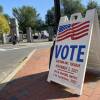Boston will make history tomorrow by electing its first female mayor, but voters won't post any kind of historically high turnout numbers according to campaign watchers and the state's top elections officer.
Secretary of the Commonwealth William Galvin expects 135,000 in-person and remote votes to be cast in the 2021 election, which would be down five percent from 2013's high point of 142,000 votes in former Mayor Marty Walsh's first win.
Galvin told reporters at his traditional election-eve press conference the true measure of the turnout will be determined by how excited voters are for the candidates, at-large City Councilors Annissa Essaibi George and Michelle Wu.
"I guess no one is terribly frightened by the prospect of either the finalists becoming mayor, or terribly excited," the secretary said. Galvin, a Brighton Democrat who's overseen the state's elections since 1995, said turnout will be up to the campaigns and whether supporters of candidates defeated in September's preliminary election will come out to support one of the finalists.
"I don't think the intensity is in this race as we've seen in some prior races," Galvin said.
Several election experts agree with Galvin that turnout in 2021 won't impress.
"There aren't any signs that I've seen that it's going to be a sudden explosion of turnout over what we saw in the prelim," said MassINC Polling Group president Steve Koczela, who's kept a close eye on the race.
Koczela noted that only around 108,000 votes were cast in the preliminary election in September, representing a downward trend that has continued since the prelim eight years ago.
"That was not a good sign for turnout in the sense that there are now 65,000 more voters in Boston than there were in 2013," Koczela said.
Koczela said if the city musters around 140,000 voters for tomorrow's election, it would nearly match the total number of votes cast in 2013, but would still be a downturn given Boston's population growth over that time.
"That would represent a smaller share of city voters than cast their ballots in 2013," Koczela said.
Rivera Consulting president Wilnelia Rivera estimates the general election will attract about 20% more votes than the preliminary, or about 135,000 voters, the same total as Galvin's estimate.
"I don't think we should expect a large departure in the general than what we saw in the preliminary in terms of the sort of traditional turnout," Rivera said.
Rivera pointed out that since more than 44% of the voters from the preliminary supported a candidate other than Wu or Essaibi George, the voters to watch are the ones looking to pick between the two finalists as well as the roughly 25,000 voters who skipped the prelim.
Boston Ward 4 Democratic Party Chair Jonathan Cohn, who is supporting Wu, watched how Essaibi George performed well in the preliminary and helped defeat acting Mayor Kim Janey with support from traditionally high-turnout precincts.
"Annissa and Kim both often won big where they won and lost terribly where they lost, but places where Annissa won big were big turnout areas and the parts where Kim won big weren't," Cohn said.
But Cohn doesn't know if Essaibi George's dependable base will be enough to overtake Wu in the general.
"Considering that some of the high turnout areas like in Neponset that were for Annissa in the prelim had such high turnout to begin with, there's not as much room for turnout growth there," Cohn said.








